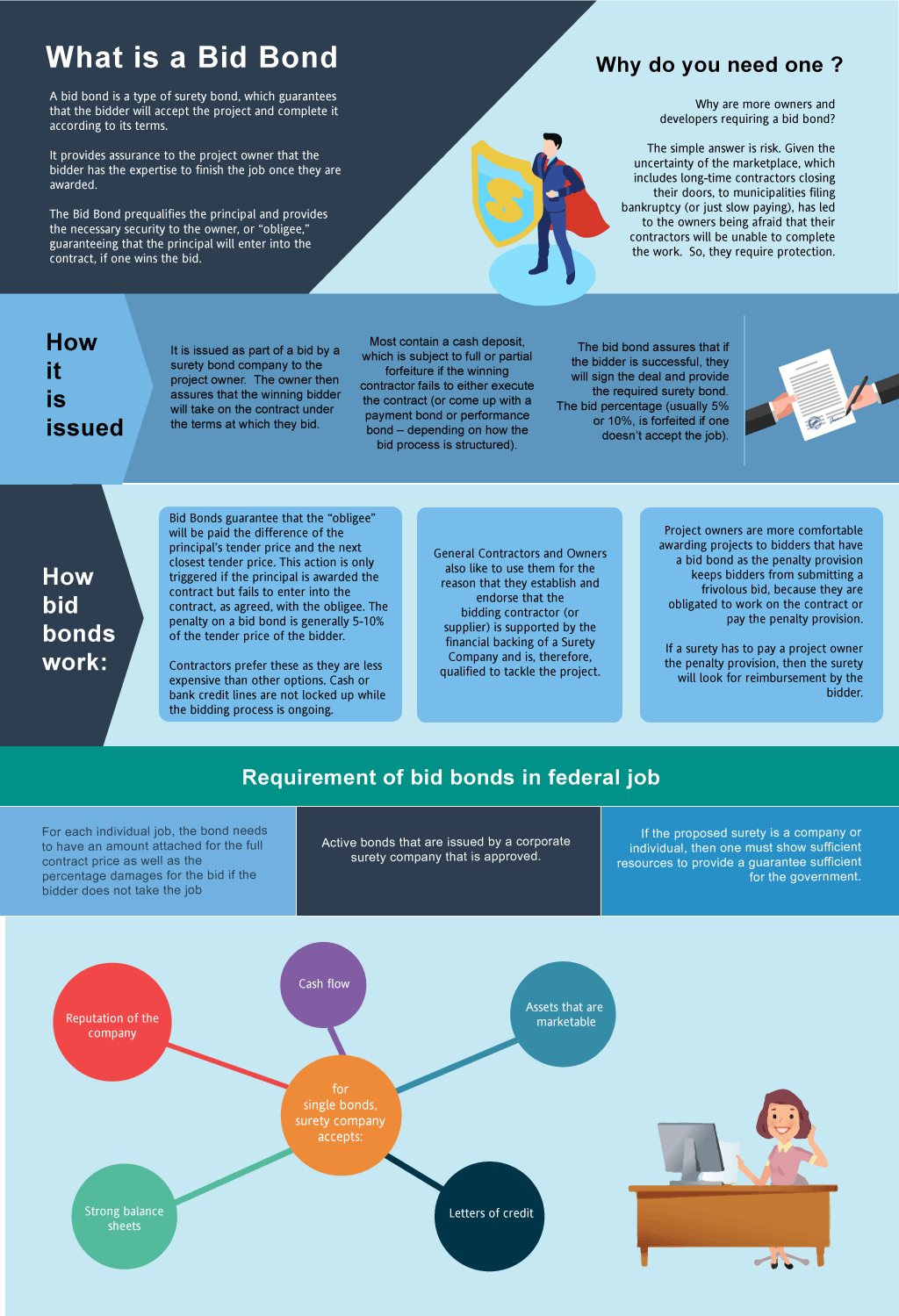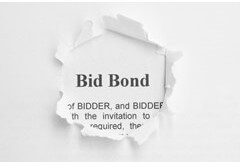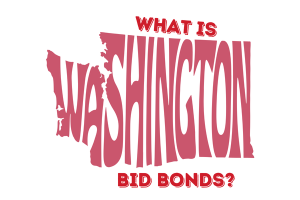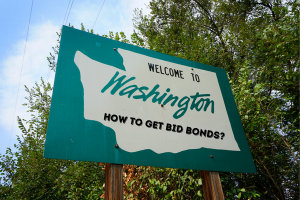You can now get a Bid Bond (almost) instantly. For Bids under $100,000, click here 
For all bids greater than $100,000, get our Express Application form:
Express Application (click to download form)
- Complete the form and email to [email protected].
- Be sure to include the RFQ/ITB (bid specs from the obligee).
What is a Bid Bond in Washington?
A bid bond is one of the types of surety bonds, that guarantees that the bidder will enter into the agreement and complete it according to its terms. The bid bond provides assurance to the project owner that the bidder has the knowhow and wherewithal to complete the job once the bidder is selected after winning the bidding process. The simple reason is that you need one to get the work. But the bigger question is why are more owners/developers requiring a bid bond in the first place? The answer is risk. Given the uncertainty of the marketplace, which includes experienced contractors closing their doors, to municipalities filing bankruptcy (or just slow paying), has led to owners being afraid that their contractors will be unable to complete the work. So, they require a some protection.
Just fill out our bond application here and email it to [email protected] - click here to get our Washington Bid Bond Application

A bid bond is issued as part of a bid by a surety bond company to the project owner. The owner is then assures that the winning bidder will take on the contract under the terms at which they bid.
Most bid bonds contain a bid percentage (usually five or ten percent, is forfeited if you don’t accept the job).

How much does a Bid Bond Cost in Washington?
Swiftbonds does not charge for a surety bid bond (with two exceptions, see below). The reason that we don't charge for a bid bond is that we will charge for the P&P bond if you get the job. The cost of a bid bond can vary widely depending on the amount of coverage that is required (see below).
Two exceptions for bid bond charges:
1) We do charge for Overnight fees
2) We will charge you if there is NOT going to be a bond on the contract.
How much do bonds cost in WA?
Bond prices fluctuate based on the job size (that is, it's based on the cost of the underlying contract). The cost of a bond is estimated through a couple of back-of-the-envelope calculations. In general, the cost is approximately three percent (3%) for jobs under $800,000 and then the percentage is lower as the contract amount increases. We work diligently to find the lowest premiums possible in the state of Washington. Please call us today at (913) 286-6501. We'll find you the very best rate possible for your maintenance bond or completion bond. Things that can affect this pricing are the perceived risk of the job, the financial position of the entity being bonded, plus other factors.
| Bond Amount Needed | Fee |
| <$800,000 | 2-3% |
| >$800,000<$1,500,00 | 1.5-3% |
| >$1.500,000 | 1-3% |
These rates are for Merit clients, Standard rates are higher. See our Performance Bond Cost page for more.
How do I get a Bid Bond in Washington?
We make it easy to get a contract bid bond. Just click here to get our Washington Bid Bond Application. Fill it out and then email it and the Washington bid specs/contract documents to [email protected] or fax to 855-433-4192.
You can also call us at (913) 286-6501. We will review each and every application for bid and P&P bonds and then submit it to the surety that we believe will provide the best bid bond for your contract. We have a very high success rate in getting our clients bid bonds at the best rates possible.

Mastering Washington Bid Bonds: Your Key to Winning Contracts
Securing bid bonds in Washington is not just a regulatory requirement, it’s an essential tool for building trust and demonstrating your commitment in competitive bidding processes. From our perspective, understanding how to acquire and manage bid bonds can significantly impact your chances of success in winning contracts and maintaining strong relationships with project owners. Let’s explore the key aspects of Washington bid bonds and how they can work for your business.
Unlock the Power of Washington Bid Bonds
In our observation, bid bonds in Washington are a crucial part of the construction bidding process. They provide a guarantee to project owners that the bidder, if awarded the contract, will honor their commitment and provide the required performance and payment bonds. This type of surety bond ensures that the bidder is serious and capable of completing the project within the agreed terms. From our perspective, securing a bid bond demonstrates a contractor’s reliability and professionalism.
Find Your Bid Bond Near You: How to Get Started
We’ve consistently found that finding a bid bond near you in Washington is more straightforward than you might think. Many insurance agencies and surety companies offer bid bonds tailored to contractors and businesses in various sectors. These professionals understand the specific legal and operational requirements of Washington state, providing bonds that meet local regulatory standards. We’ve noticed that most reputable agencies can guide you through the process with ease, ensuring that you’re well-prepared for your bidding endeavors.
Discover Who Needs Bid Bonds in Washington

We’ve encountered several situations where specific individuals and entities in Washington are required to obtain bid bonds, including:
- Contractors bidding on public works or government projects: In Washington, public works projects usually require contractors to submit a bid bond as part of their proposal. This ensures that the contractor is financially capable of taking on the project.
- Businesses bidding on large-scale private contracts: Private contracts for larger projects often require bid bonds to guarantee that the bidding company will follow through if awarded the contract. This protects the project owner from potential financial losses.
- Subcontractors working with general contractors on bonded projects: Subcontractors who participate in public or private projects that require bonding may also need to submit a bid bond to show they can fulfill their part of the project if selected.
- Developers engaged in construction or infrastructure improvement: Developers involved in construction projects for public infrastructure or large-scale private developments often need bid bonds to secure their place in competitive bidding processes.
We provide bid bonds in each of the following counties:
Adams
Asotin
Benton
Chelan
Clallam
Clark
Columbia
Cowlitz
Douglas
Ferry
Franklin
Garfield
Grant
Grays Harbor
Island
Jefferson
King
Kitsap
Kittitas
Klickitat
Lewis
Lincoln
Mason
Okanogan
Pacific
Pend Oreille
Pierce
San Juan
Skagit
Skamania
Snohomish
Spokane
Stevens
Thurston
Wahkiakum
Walla Walla
Whatcom
Whitman
Yakima
And Cities:
Seattle
Spokane
Vancouver
Tacoma
Olympia
Bellevue
Everett
Bellingham
Yakima
Kent
See our West Virginia Bid Bond page here.
More on Bid Bonds https://swiftbonds.com/bid-bond/.
Key Considerations Before You Apply for a Bid Bond
Through our own efforts, we’ve come to understand that obtaining a bid bond is not just about filling out paperwork; it requires a solid understanding of your project capabilities and financial standing. Contractors should assess their ability to perform the work outlined in the bid to avoid forfeiting the bond.
Important Factors for Securing Your Bid Bond
Based on our experience, here are some key considerations contractors should keep in mind:
- Financial Stability: We’ve consistently found that contractors with solid financials are more likely to secure a bid bond. Lenders and surety companies evaluate your financial health to ensure you have the resources to complete the project without running into financial trouble.
- Experience: We’ve seen firsthand how experience with similar projects increases the likelihood of getting a bond. Having a proven track record of successfully completed projects gives the surety company confidence in your ability to handle the job.
- Reputation: In our observation, contractors with a good reputation in the industry find it easier to obtain bonds. Positive references from previous clients and a clean business history will work in your favor during the application process.
- Legal and Regulatory Compliance: Following Washington’s construction and bidding regulations is crucial, from our perspective. If you have any outstanding legal issues or haven’t adhered to local regulations, surety companies may see this as a red flag and deny your application.
- Timely Project Completion: We’ve come to realize that maintaining a history of completing projects on time is beneficial. Surety companies prefer contractors with a record of timely performance, as delays can lead to financial loss and complicate project management.
What is a Surety Bid Bond and Why You Need It
We’ve been in situations where explaining surety bid bonds is crucial to contractors. A surety bid bond acts as a contract between three parties: the obligee (usually the project owner), the principal (the contractor), and the surety company that backs the bond. What we’ve experienced is that this bond not only reassures project owners but also offers protection for all parties involved, ensuring that financial and contractual commitments are met.
How Do Washington Bid Bonds Work?
We’ve come across many situations where understanding the mechanics of bid bonds is essential for contractors bidding on large projects. In Washington, when a contractor submits a bid for a public project, they typically include a bid bond to demonstrate their commitment. If the contractor is awarded the contract but fails to proceed, the project owner can claim the bond. From what we’ve seen, this process helps keep bidders accountable and ensures a fair bidding environment.

Your Step-by-Step Guide to Applying for a Surety Bid Bond in Washington
In our line of work, we’ve had firsthand experience with contractors applying for surety bid bonds. The application process usually involves a credit check, financial review, and documentation of previous work experience. We’ve found that preparing the necessary documents ahead of time can significantly streamline the process. The better your financial standing and work history, the easier it will be to secure a surety bond in Washington.
Step-by-Step Process to Secure Your Bid Bond
From our own observations, here’s a step-by-step process to help you apply for a bid bond:
- Find a Reputable Surety Company: Start by identifying a surety company licensed to issue bonds in Washington. This ensures that the bond will meet local regulatory requirements.
- Complete the Application: Provide personal, business, and financial information as required by the surety. The information helps them assess your ability to complete the project.
- Submit Financial Documentation: Include balance sheets, income statements, and details of past project performance. The surety needs to understand your financial health and previous experience with similar contracts.
- Credit Check: The surety company will perform a credit check to assess your risk level. A higher credit score often leads to better terms and quicker approval.
- Underwriting Review: The surety evaluates your financials, experience, and project details. This is where they determine whether to issue the bond.
- Receive the Bond: If approved, you will receive your bid bond to submit with your bid proposal. Keep in mind, the bond is only effective if it is submitted within the deadline of the bidding process.
What Does a Surety Bid Bond Cost?
We’ve come to believe that understanding the cost of a bid bond is a critical part of planning your bidding strategy. Based on our experience, the price of a bid bond is generally a small percentage of the total bid amount, often ranging from 1% to 5%. We’ve learned through doing that maintaining a good credit score and solid financials can help lower the cost of your bond, making it a more affordable option for contractors of all sizes.
Could Your Bid Bond Be Denied?
We’ve been fortunate enough to guide contractors through bid bond applications, and one thing we’ve learned over the years is that there is a possibility of being denied. This can happen if the contractor has poor credit, insufficient financial resources, or a lack of experience in similar projects.
Common Reasons for Bid Bond Denial
From our perspective, the most common reasons for being denied a bid bond include:
- Poor credit history: Surety companies look closely at your credit score to assess your financial reliability. If you have a low credit score, it might indicate to the surety that you're a high risk.
- Lack of experience with similar projects: If your company hasn’t handled similar projects in scope or size, the surety might be hesitant to issue a bond. They prefer companies with a track record of success in related jobs.
- Insufficient financial backing: Sureties want to ensure that you have the financial resources necessary to see the project through. Inadequate capital can lead to a denial.
- Legal or regulatory issues: Having unresolved legal issues, such as past bond claims or failure to meet regulatory requirements, can negatively impact your bond approval.
- High-risk project type: Certain types of projects, such as those in volatile industries or remote locations, may carry more risk and result in bond denial.
How to Avoid a Denial and Secure Your Bid Bond
In our dealings with contractors, we’ve seen that taking proactive steps can help prevent bid bond denial. Here’s what we’ve identified as key actions:
- Improve Your Credit: Regularly check your credit score and address any negative issues. We’ve noticed through our work that improving your credit standing opens up more favorable terms with surety companies.
- Build Your Experience: Start with smaller projects and gradually bid on larger contracts. In our professional life, we’ve observed that sureties are more comfortable issuing bonds to contractors with a history of successful, similar projects.
- Maintain Solid Financials: Ensure your financial documents reflect a healthy and stable business. Our experience tells us that surety companies value financial stability when approving bid bonds.
- Resolve Legal Issues: Stay compliant with state laws and rectify any regulatory concerns. Sureties are hesitant to issue bonds to businesses with unresolved legal disputes or penalties.
- Choose Suitable Projects: Avoid bidding on projects beyond your financial or operational capacity. We’ve often seen contractors overextend themselves, leading to bond denials or project failures.

Final Thoughts: Why Bid Bonds Are Key to Your Success in Washington
In our view, bid bonds play a fundamental role in Washington’s construction industry, ensuring that only serious, qualified contractors take part in the bidding process. We’ve had the opportunity to witness how these bonds protect both project owners and contractors, contributing to a fair and secure construction environment. By requiring contractors to secure bid bonds, project owners can feel confident that bidders are financially stable and committed to completing the work.
We’ve consistently observed that contractors who understand and properly manage their bid bonds are more likely to succeed in securing contracts. Whether you're new to bidding or a seasoned professional, securing a bid bond is a crucial step toward winning projects and building a strong reputation in Washington. From what we’ve seen, contractors who pay attention to their financial standing, reputation, and legal compliance can significantly enhance their chances of success in obtaining and maintaining bid bonds.

